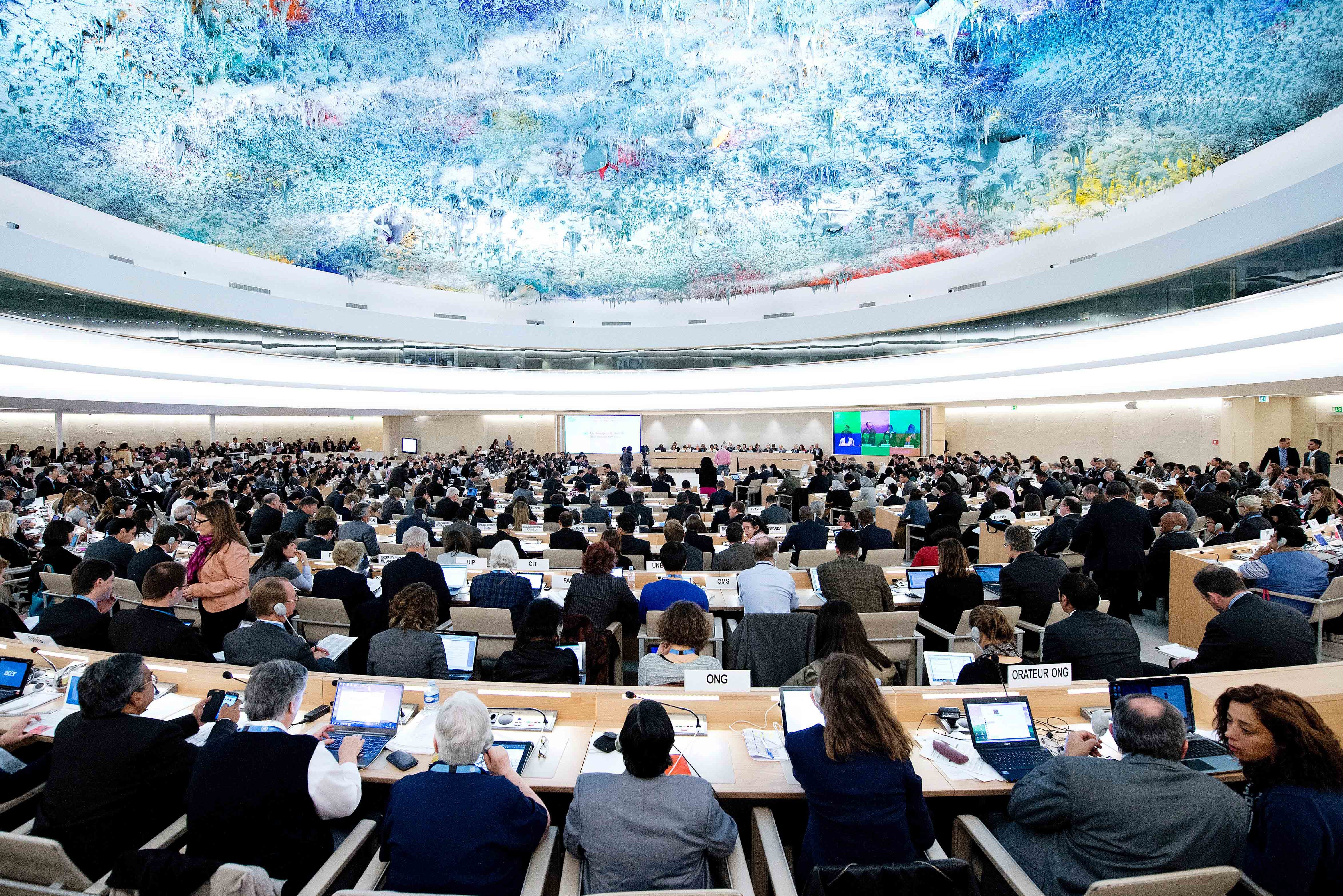
Jun 24, 2015 | Advocacy
The ICJ joined more than 100 organizations in endorsing a call before the UN Human Rights Council for accountability of US officials responsible for torture and enforced disappearances in the rendition and secret detention programmes and for reparations to be provided for the victims.
The call was made by the American Civil Liberties Union, the Centrol de Estudios Legales and Sociales, Conectas Direitos Humanos, and the Washington Office on Latin America.
The statement can be downloaded here:
USA-HRC29ShortOralStatementTortureRendition-Advocacy-2015-ENG (short version, in PDF)
USA-HRC29StatementTortureRendition-Advocacy-2015-ENG (full text in PDF)
USA-HRC29StatementTortureRendition-Advocacy-2015-SPA (full text in PDF, Spanish)
USA-HRC29StatementTortureRendition-Advocacy-2015-ARA (full text in PDF, Arabic)

Mar 25, 2015 | Advocacy, Non-legal submissions
La Comisión Colombiana de Juristas afiliada a la Comisión Internacional de Juristas resaltan el valioso aporte de la Oficina del Alto Comisionado durante estos 18 años en Colombia.
25° período de sesiones, Consejo de Derechos Humanos de Naciones Unidas
Tema 2 de la agenda, Informe anual de la Alta Comisionada de las Naciones Unidas para los Derechos Humanos sobre la situación de derechos humanos en Colombia (A/HRC/28/3/Add.3)
Situación de derechos humanos en Colombia
25 de marzo de 2015
Señor Presidente:
La Comisión Colombiana de Juristas afiliada a la Comisión Internacional de Juristas resaltan el valioso aporte de la Oficina del Alto Comisionado durante estos 18 años en Colombia: tiene oficinas en varias regiones y trabaja con comunidades afectadas por el conflicto armado; ha contribuido “a cambios positivos a través de su observación, incidencia, declaraciones públicas, buenos oficios y cooperación técnica”; “[h]a presentado informes periódicos a entidades gubernamentales; ha actuado como garante en conflictos (…); ha interactuado a diario con el Estado y la sociedad civil para encontrar soluciones a los desafíos de derechos humanos (…); y ha contribuido al fortalecimiento de las instituciones” (párrafo 2).
Pese a ciertos avances en derechos humanos, el Informe anual resalta los retos en materia de implementación, falta de voluntad política para aceptar la responsabilidad por violaciones del pasado1, desigualdades económicas y “un acceso asimétrico a los derechos y a los servicios públicos” (párrafo 14). Además, Colombia todavía actúa en contra de sus obligaciones internacionales, como sucede con el derecho a la consulta previa (párrafo 26) o la ampliación de la justicia militar (párrafo 60). Adicionalmente, Colombia no recibe procedimientos especiales desde 2010, aunque cuenta con una invitación permanente y seis mandatos han solicitado visita2.
Después de 18 años invertidos en el país, la Oficina sigue siendo los ojos de la comunidad internacional para derechos humanos, y el acompañante o asesor del Estado en el diseño de sus políticas (párrafos 16, 29, 34, 60).
Según el Informe, el Gobierno y las FARC-EP han logrado avances sin precedentes para poner fin al conflicto armado (párrafo 6). Si “[l]a perspectiva de una salida negociada al conflicto (…) y el crecimiento económico proporcionan una oportunidad única para ampliar la presencia del Estado, hacer frente a la desigualdad y mejorar la situación de los derechos humanos” (párrafo 19), indiscutiblemente la Oficina del Alto Comisionado en Colombia es una inversión clave, y no es de corto plazo.
Gracias señor Presidente.
1 El párrafo 58 dice: “El rechazo de responsabilidades por parte de las fuerzas armadas y de sus superiores políticos perpetúa la impunidad, socava la legitimidad institucional y erosiona el estado de derecho”.
2 Colombia cuenta con una invitación permanente a los procedimientos especiales de la ONU desde el 17 de marzo de 2003. Sin embargo, desde inicios de 2012 no ha aceptado ninguna visita, aunque los mandatos sobre extrema pobreza, personas internamente desplazadas, violencia contra la mujer, afrodescendientes, mercenarios y alimentación han solicitado visitar el país.

Mar 18, 2015 | Non-legal submissions
The Colombian Commission of Jurists, an affiliate of the ICJ, made an oral statement to the UN Human Rights Council today, addressing threats to the independence of the judiciary in Bolivia.
The statement came in the discusson of Bolivia’s review by the Council universal periodic review procedure, in which Bolivia accepted recommendations on judicial independence, including to “guarantee the full independence of the judiciary system, in accordance with…international standards.”
In response, the ICJ and Colombian Commission of Jurists highlighted the disciplinary and criminal proceedings brought by the Legislative Assembly against three judges of the Constitutional Court at the end of last year. The proceedings were based solely on the disagreement of the political branches with an interim order issued by the Court in a case challenging the constitutionality of a new law to regulate notaries.
In the so-called “trial” conducted by the Legislative Assembly in December, Assembly Members’ statements demonstrated a manifest lack of impartiality. The Assembly extensively and arbitrarily limited the rights of the judges to present evidence and witnesses in their defence.
In the result, one judge was arbitrarily removed from office in January, and another resigned under the pressure. The Assembly also referred both of these women for criminal prosecution. Proceedings against a third judge were suspended only for health reasons.
As the Government had announced that it will seek radical reform of the judicial system during 2015. In light of recent events, the two organisations asked:
- How will Bolivia ensure that reforms are consistent with universal and regional standards on the role and independence of the judiciary?
- What role will Bolivian and international civil society and legal experts have in developing the reforms?
- Will reforms ensure a judicial selection procedure that is based on objective criteria and truly independent of the executive and legislative branches of government?
- Will consideration be given to transferring responsibility for discipline and removal procedures to a new independent and impartial body, with real guarantees of fairness, and clearly defined grounds for removal that exclude disagreement with rulings?
Ireland had also raised concern about independence and effectiveness of the judiciary in its oral statement.
The delegation of Bolivia mentioned in its opening statement its intention to convene a forum on judical reforms and put reforms to a referendum, but did not provie any details other than that various sectors of Bolivian society would be involved. During the opportunity given at the end of the session to respond to the questions from states and NGOs, the delegation of Bolivia chose not to address these issues.
Read also Bolivia: ICJ condemns removal and forced resignation of Constitutional Court judges by Legislative Assembly and links therein.
The full written statement may be downloaded in PDF format here: Bolivia-HRC28-UPR-Advocacy-non legal submission-2015-ENG

Sep 5, 2014 | Advocacy, Non-legal submissions, Uncategorized
The ICJ, Amnesty and independent experts Eugene R. Fidell, Elizabeth L. Hillman, Nancy Duff Campbell, made a submission for the Universal Periodic Review (UPR) of the United States on the failure of the US military justice system to comply with the State’s international human rights obligations.
USA-Military Justice system UPR-Advocacy-non legal submission-2014 (full text in pdf)

Jun 23, 2014 | Advocacy, Non-legal submissions
The ICJ has delivered an oral statement on the independence of judges, prosecutors and lawyers in Venezuela, at the UN Human Rights Council in Geneva.
Referencing its report, Strengthening the Rule of Law in Venezuela, the ICJ discussed the failure by Venezuelan authorities to respect institutional guarantees for the independence and impartiality of the judiciary and prosecutors, as well as undue interference with individual judges, prosecutors and the legal profession. The ICJ highlighted the lack of security of tenure for most judges and virtually all prosecutors in Venezuela, and how the insecurity is amplified by cases of reprisal such as against Judge María Lourdes Afiuni Mora.
The ICJ urged Venezuelan authorities to take concrete measures to restore the rule of law and ensure the protection of human rights in Venezuela, in meaningful dialogue with civil society, and for other states to encourage Venezuela to do so.
The oral statement can be downloaded in full in PDF format here: ICJ-HRC26-Item4-Venezuela-OralStatement2-Advocacy-non-legal submission-2014

Jun 16, 2014 | Advocacy, Non-legal submissions
The ICJ today made an oral statement at the UN Human Rights Council, in the interactive dialogue with the Special Rapporteur on the independence of judges and lawyers, responding to her report on her visit to the Russian Federation.










